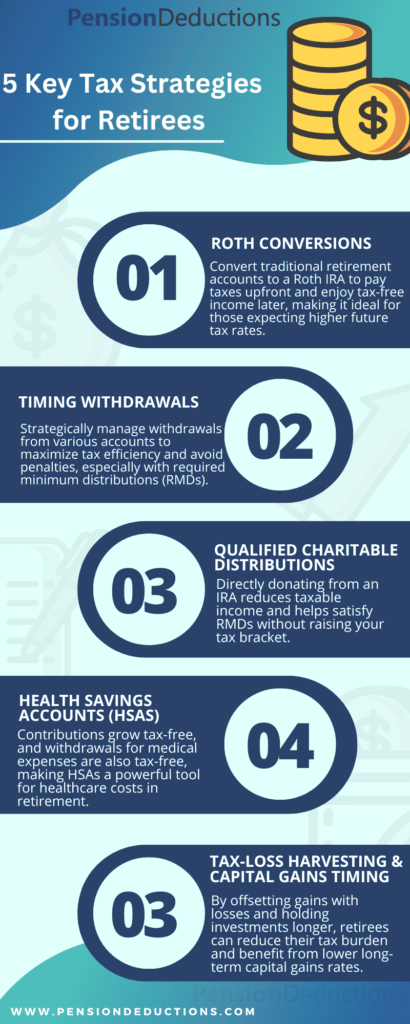Tax Strategies for your Retirement Income
Understanding Taxable and Non-Taxable Retirement Income
Social Security Benefits
Depending on your total income, up to 85% of your Social Security benefits could be taxable. Proper tax strategies for your retirement income can help minimize this impact
Traditional IRA and 401(k) Withdrawals
Withdrawals from traditional IRAs and 401(k) accounts are taxed as ordinary income. Strategic tax strategies for your retirement income can help reduce the tax burden of these withdrawals
Roth IRA and Roth 401(k) Withdrawals
Roth accounts offer a huge tax advantage because qualified withdrawals are entirely tax-free. This makes Roth accounts essential tools in tax strategies for your retirement income
Pension Income
Pensions are generally fully taxable. However, with careful tax strategies for your retirement income, you can minimize the impact of pension income on your overall tax liability
Investment Income
Income from investments (like dividends and capital gains) held in taxable accounts will also be taxed, though long-term capital gains and qualified dividends typically enjoy favorable tax rates. Incorporating this into your tax strategies for your retirement income can lead to better outcomes

1. The Power of Roth Conversion
Why a Roth Conversion Works
-
Tax-Free Withdrawals: Roth IRAs allow you to withdraw tax-free, making them a key component in tax strategies for your retirement income
-
Legacy Planning: Roth accounts are not subject to required minimum distributions (RMDs) during your lifetime, which helps protect your estate
-
Tax Diversification: Having both traditional and Roth accounts provides flexibility to manage taxes more efficiently, optimizing your tax strategies for your retirement income
2. Timing your Withdrawals for Maximum Tax Efficiency
Delaying Social Security
Delaying Social Security is a key tax strategy for your retirement income, as waiting can significantly boost your monthly benefit. Plus, it helps keep taxable income lower in the early years of retirement.
Strategize with Required Minimum Distributions (RMDs)
By law, you must begin taking RMDs from your traditional IRA, 401(k), and other tax-deferred accounts by age 73 (as of 2024). Proper planning for RMDs is essential in tax strategies for your retirement income to avoid high taxes in later years
3. Utilizing Qualified Charitable Distributions (QCDs)
Advantages of QCDs
-
Lower Taxable Income: Since the donation doesn’t count as income, it helps keep you in a lower tax bracket—an important consideration in tax strategies for your retirement income
Schedule a Free Consultation Now!
4. Be Smart with your Investment Withdrawals
Tax-Loss Harvesting
This is one of the best tax strategies for your retirement income. By offsetting gains with losses, you can significantly reduce taxable income
Capital Gains Timing
Holding investments for at least a year qualifies them for lower long-term capital gains rates, a crucial tactic in tax strategies for your retirement income
5. Tax Bracket Management: Stay in the Sweet Spot
-
Roth IRA Withdrawals to Lower Taxable Income
Roth withdrawals are tax-free, making them a core component of your tax strategies for your retirement income. -
Consider the 12% or 22% Tax Bracket
Structuring your withdrawals to stay within these favorable brackets is crucial for effective tax strategies for your retirement income
6. Health Savings Accounts (HSAs): Tax-Free Medical Expenses
7. Work with a Financial Planner or Tax Advisor
Conclusion
By staying informed and working with professionals, you’ll be well-prepared to adapt your tax strategies for your retirement income over time, ensuring financial efficiency throughout your retirement years.
SHARE THIS POST
Discover the key differences between a Defined Benefit Plan vs 401k, and find the best pension plan for small business owners.
Explore the latest Retirement Trends in 2025, including 401(k) updates, automatic portability, and inflation-resistant strategies, to secure your future.
Discover the 3 retirement rule changes in 2025, including contribution limits, RMD updates, and automatic portability. Plan smarter today!
Year-end financial planning in the USA helps optimize retirement savings, reduce taxes, and secure your future with proactive strategies.


